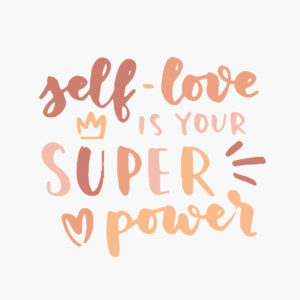Let’s start here – Do you like your own company? Are you someone you would choose to spend time with if given the option? If the answer is a hard “no” or, “well, sometimes, but not all of the time” then read on, this one is for you.
Our Ideas on What Self-Love Is
There was a time when I thought self-love was some glorious, idealized, nonplussed state of being in the world, epitomized by an air of serenity, groundedness and a good amount of self-possession and certainty.
The wellness industry sells us on the idea that self-love is about treating ourselves special, setting boundaries with a fierce “no,” and repeating affirmations in the mirror until they stick.
And while those things have their place, what I’ve come to understand through my life journey so far and the many different roles I hold – mom of two teenagers, wife, friend, therapist, teacher, practice owner & manager, sister, daughter, cousin etc – is that cultivating self-love is far more dynamic, messier, more uncomfortable, and requires utter and sheer honesty, humility and self-compassion.
The Myth of “Loving Yourself” All the Time
We all have variations in our being which can make it very challenging to like every single part or expression of yourself. Fortunately cultivating self-love doesn’t require you to like everything about yourself.
When I feel my best I feel content, steady, buoyant, silly, receptive and grateful. When I’m feeling my worst, I feel tired, cranky, edgy, impatient and constricted – parts I don’t particularly like or enjoy.
In those moments it’s easier for me to snap at my family in a way I don’t feel particularly proud of, making it easier for me to condemn myself, or snapping at myself actually, for behaving in hurtful ways to those I love most.
Loving myself means resisting that urge to berate myself for those tendencies. It means instead, to bring a good dose of accountability and compassion to such moments, repair any hurt I may have caused and try my best to understand and better manage such reactivity going forward.
Self-love means acknowledging and creating space for all the different aspects and manifestations of your being and owning them, and choosing to bring tenderness to yourself in any way you can. But in order to do so, we must start with acceptance.
Self-love isn’t a fixed state – it requires a growth mindset that goes beyond simply liking every part of yourself. It’s about creating space for getting to know every nook and cranny of your beautifully imperfect self, understanding that you can evolve and grow through self-acceptance.
Self-Acceptance: The Hardest and Most Important Step
Loving our best parts can be easy. It’s the parts of us we’d rather not see, deal with or face that provide the true challenge to and real path towards practicing and cultivating authentic self-love.
In my therapy practice, I see so many people chasing the elusive feeling of self-love while skipping over the foundational work of self-acceptance. But here’s the thing: You can’t cultivate love for yourself if you don’t first accept yourself as you are.
Acceptance does not equal approval or celebration. Acceptance means sitting with the parts of ourselves we struggle with—not in judgment, but in curiosity. It means asking:
- Can I allow this part of myself to show up and have some space?
- Can I be with this part of myself without pushing it away?
- Can I hold space for my imperfections the way I would for a friend?
- Can I offer myself grace in the moments I feel least deserving of it?
For me, yoga, meditation, and journaling have been invaluable tools in this process. They teach me to sit with discomfort, breathe through it, and recognize that my thoughts and emotions don’t define me.
On my yoga mat, I practice meeting myself where I am, not where I think I should be. Some days, that means holding a handstand or Warrior II with strength. Other days, it means collapsing into Child’s Pose because that’s all I have to give and what I need most. Both are enough.
These practices also help me balance holding myself with a certain level of gravity and levity. There are times when I need to be more earnest in my self-holding and times when I need to say, “ah, there I go again, being a silly human, take note to try better next time.”

Self-Love in the Chaos of Motherhood
Motherhood has been and continues to be my greatest teacher in learning how to love myself for all my foibles and flaws.
As a mom, I see my children’s struggles and shortcomings, and yet my love for them never wavers. If they’re having a hard day, even if I don’t like how they may be expressing their struggles, I don’t withhold kindness until they “earn” it. I show up for them, even in their messiest and most challenging moments.
What if we did the same for ourselves?
I try to remember this when I feel overwhelmed, exhausted, or when the voice in my head starts whispering that I should be doing more. I remind myself that I am not the sum of my worst days. That the same patience and love I extend to others, I also deserve.
It’s in the moments when we struggle the most, when a practice of self-love and all that comes with it: self-compassion, self-forgiveness, self-reflection are most needed.
What Self-Love Looks Like in Real Life
So, what does self-love really look like? It looks like:
- Speaking to yourself with kindness, even when you mess up. Watch your inner and outer narrative about yourself. For example, try saying the following two phrases and see how they rest in your body “I can’t do this!” vs “I’m struggling with this now, but I can find a way through.”
- Discerning and honoring your needs, requires setting time aside for you to listen to yourself, to create true understanding of what you need most.
- Giving yourself permission to rest, even when your to-do list is unfinished.
- Choosing progress over perfection, because perfection isn’t real. Learning how to take things in stride and see the larger picture over getting stuck on expectations.
- Expressing tenderness not harshness towards yourself, through thoughts, words, actions and choices.
- Showing up for yourself, even on the days you feel like you want to crawl out of your skin.
- Not striving for an ideal or perfection, since perfection is a myth and does not align with self-worth.
Self-love isn’t a finish line you cross. It’s a daily ongoing practice—one you commit to, over and over, with patience and grace.
And on the days when it feels impossible, when you’re exhausted, frustrated, feeling helpless or unknowing or drowning in self-doubt, let this be your reminder: You don’t have to love every part of yourself to be worthy of love. You already are.
Cultivating self-love isn’t meant to inflate your ego or induce delusions of grandeur. Cultivating self-love is about taking responsibility for yourself and honoring the fact that your individual life, the body you were given, your soul or essence is unique and made of love and will only evolve, grow and thrive when cared for with love.
Breathe that in. And be gentle with yourself today.
Ready to transform your relationship with yourself? Take that first step and reach out to our team today and start that process.




